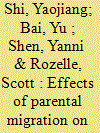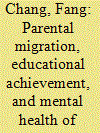|
|
|
Sort Order |
|
|
|
Items / Page
|
|
|
|
|
|
|
| Srl | Item |
| 1 |
ID:
152518


|
|
|
|
|
| Summary/Abstract |
China's rapid development and urbanization over the past 30 years have caused large numbers of rural residents to migrate to urban areas in search of work. This has created a generation of children who remain behind in rural areas when their parents migrate for work. Previous research has found mixed impacts of parental migration on the educational achievement of left-behind children (LBC), perhaps because of methodological deficiencies and lack of recognition of the heterogeneity of this population of children. Our study attempts to examine the impact of six types of parental migration on the academic achievement of a rural junior high school sample. Our study uses a panel of 7148 junior high school students to implement a difference-in-difference analysis and finds that parental migration has a negative and significant impact on the academic achievement of junior high school students. Our study suggests that the Chinese Government should implement measures to dismantle barriers to the human capital accumulation of LBC to ensure sustainable economic growth and human capital development in China.
|
|
|
|
|
|
|
|
|
|
|
|
|
|
|
|
| 2 |
ID:
145585


|
|
|
|
|
| Summary/Abstract |
China's rapid development and urbanization have induced large numbers of rural residents to migrate from their homes in the countryside to urban areas in search of higher wages. It is estimated that there are more than 60 million “left-behind children” (LBC) remaining in the countryside after their parents migrate, typically living with surrogate caregivers. Extensive research has focused on the impact of parental out-migration on children's mental health, but less attention has been paid to the effects of parental return-migration. The present paper examines the changes in mental health before and after the parents of fourth and fifth grade students out-migrate or return-migrate. We draw on a panel dataset collected by the authors of more than 19000 students from 252 rural primary schools in northwestern China. Using DID and propensity score matching approaches, our results indicate that parental out-migration has a significant negative impact on the mental health of LBC, as they tend to exhibit higher levels of anxiety and lower levels of self-esteem. However, we find that parental return-migration has no significant effect on the mental health of LBC.
|
|
|
|
|
|
|
|
|
|
|
|
|
|
|
|
| 3 |
ID:
143381


|
|
|
|
|
| Summary/Abstract |
Child health is not only a key indicator of overall quality of public health, but also vital for the future economic development of a country. In recent years, with unprecedented urbanization of China, many children in rural areas have been left behind while their parents migrate to urban areas to seek employment opportunities. Thus, it is considerably important for us to understand the effects of lack of parental care on the health status of left-behind children. Using data from China Health and Nutrition Survey (CHNS), we find that the left-behind children in rural areas are significantly 20.0% more likely to get sick or develop chronic conditions than those living with their parents. We also find that girls are more vulnerable than boys and younger children are more vulnerable than older children to lack of parental care.
|
|
|
|
|
|
|
|
|
|
|
|
|
|
|
|
| 4 |
ID:
182941


|
|
|
|
|
| Summary/Abstract |
Drawing from two ethnographic studies of children, one in a former industrial neighbourhood in the process of demolition in Shanghai, and the other in a rural town in Guangdong, this article explores the relationships children form with the landscape of ruins as they wander about with the aim of identifying the opportunities these offer in terms of games, freedom, and sharing, etc. The article analyses two different dynamics in the types of ruins and the experiences associated with them: concentration and dispersion. The structural geography and qualitative demography that emerge from this are barely mentioned in Chinese public debate, in its categories (children of “migrant workers” or “left-behind” children), its problems, and its very negative representations, but whilst they underline the unequal divisions in society, they also reveal a richness of experience that is far from being necessarily unhappy.
|
|
|
|
|
|
|
|
|
|
|
|
|
|
|
|
| 5 |
ID:
170104


|
|
|
|
|
| Summary/Abstract |
China's rapid development has led to an unprecedented increase in migration rates as an ever-growing number of rural residents migrate to urban areas to seek better job opportunities and help alleviate family poverty. Economic pressures and structural restrictions force many of these migrant workers to leave their children behind in their rural homes, which has led to the emergence and expansion of a new subpopulation in China: left-behind children (LBCs). This study examines the impacts of parental migration on the educational outcomes (specifically math achievement) and mental health (specifically anxiety) of LBCs using data covering 7495 children in a prefecture of Shaanxi Province (from three surveys conducted between 2012 and 2014). We distinguish between “both parents migrating,” “one parent migrating,” “only a father migrating,” and “only a mother migrating.” We also explore the impacts on male versus female LBCs. We find no significant impact of parental migration on the math achievement of LBCs. In terms of mental health, however, our results indicate that left-behind girls were negatively affected by one parent migrating, especially if the migrating parent was the father. The findings suggest that it may not be necessary for policy makers to design special programs to improve educational outcomes of LBCs in general. However, local committees, schools, and parents should pay particular attention to left-behind girls living with only one parent, as they may be more vulnerable to mental health problems than their peers.
|
|
|
|
|
|
|
|
|
|
|
|
|
|
|
|
|
|
|
|
|